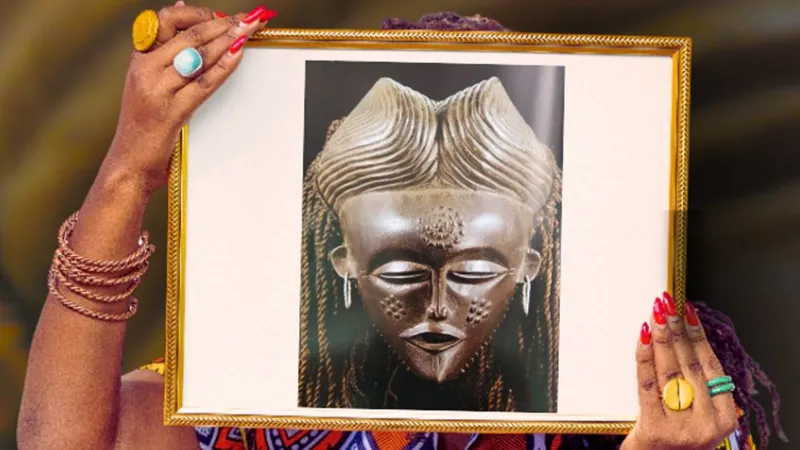International
An ancient writing system confounding myths about Africa

A wooden hunters’ toolbox inscribed with an ancient writing system from Zambia has been making waves on social media.
“We’ve grown up being told that Africans didn’t know how to read and write,” says Samba Yonga, one of the founders of the virtual Women’s History Museum of Zambia.
“But we had our own way of writing and transmitting knowledge that has been completely side-lined and overlooked,” she tells the BBC.
It was one of the artefacts that launched an online campaign to highlight women’s roles in pre-colonial communities – and revive cultural heritages almost erased by colonialism.
Another intriguing object is an intricately decorated leather cloak not seen in Zambia for more than 100 years.
“The artefacts signify a history that matters – and a history that is largely unknown,” says Yonga.
“Our relationship with our cultural heritage has been disrupted and obscured by the colonial experience.
“It’s also shocking just how much the role of women has been deliberately removed.”

But, says Yonga, “there’s a resurgence, a need and a hunger to connect with our cultural heritage – and reclaim who we are, whether through fashion, music or academic studies”.
“We had our own language of love, of beauty,” she says. “We had ways that we took care of our health and our environment. We had prosperity, union, respect, intellect.”
A total of 50 objects have been posted on social media – alongside information about their significance and purpose that shows that women were often at the heart of a society’s belief systems and understanding of the natural world.
The images of the objects are presented inside a frame – playing on the idea that a surround can influence how you look at and perceive a picture. In the same way that British colonialism distorted Zambian histories – through the systematic silencing and destruction of local wisdom and practices.
The Frame project is using social media to push back against the still-common idea that African societies did not have their own knowledge systems.
The objects were mostly collected during the colonial era and kept in storage in museums all over the world, including Sweden – where the journey for this current social media project began in 2019.
Yonga was visiting the capital, Stockholm, and a friend suggested that she meet Michael Barrett, one of the curators of the National Museums of World Cultures in Sweden.
She did – and when he asked her what country she was from, Yonga was surprised to hear him say that the museum had a lot of Zambian artefacts.
“It really blew my mind, so I asked: ‘How come a country that did not have a colonial past in Zambia had so many artefacts from Zambia in its collection?'”
In the 19th and early 20th Centuries Swedish explorers, ethnographers and botanists would pay to travel on British ships to Cape Town and then make their way inland by rail and foot.
There are close to 650 Zambian cultural objects in the museum, collected over the course of a century – as well as about 300 historical photographs.

When Yonga and her virtual museum co-founder Mulenga Kapwepwe explored the archives, they were astonished to find the Swedish collectors had travelled far and wide – some of the artefacts come from areas of Zambia that are still remote and hard to reach.
The collection includes reed fishing baskets, ceremonial masks, pots, a waist belt of cowry shells – and 20 leather cloaks in pristine condition collected during a 1911-1912 expedition.
They are made from the skin of a lechwe antelope by the Batwa men and worn by the women or used by the women to protect their babies from the elements.
On the fur outside are “geometric patterns, meticulously, delicately and beautifully designed”, Yonga says.
There are pictures of the women wearing the cloaks, and a 300-page notebook written by the person who brought the cloaks to Sweden – ethnographer Eric Van Rosen.
He also drew illustrations showing how the cloaks were designed and took photographs of women wearing the cloaks in different ways.
“He took great pains to show the cloak being designed, all the angles and the tools that were used, and [the] geography and location of the region where it came from.”
The Swedish museum had not done any research on the cloaks – and the National Museums Board of Zambia was not even aware they existed.
So Yonga and Kapwepwe went to find out more from the community in the Bengweulu region in north-east of the country where the cloaks came from.
“There’s no memory of it,” says Yonga. “Everybody who held that knowledge of creating that particular textile – that leather cloak – or understood that history was no longer there.
“So it only existed in this frozen time, in this Swedish museum.”

One of Yonga’s personal favourites in the Frame project is Sona or Tusona, an ancient, sophisticated and now rarely used writing system.
It comes from the Chokwe, Luchazi and Luvale people, who live in the borderlands of Angola, the Democratic Republic of Congo and Yonga’s own north-western region of Zambia.
Geometric patterns were made in the sand, on cloth and on people’s bodies. Or carved into furniture, wooden masks used in the Makishi ancestral masquerade – and a wooden box used to store tools when people were out hunting.
The patterns and symbols carry mathematical principles, references to the cosmos, messages about nature and the environment – as well as instructions on community life.
The original custodians and teachers of Sona were women – and there are still community elders alive who remember how it works.
They are a huge source of knowledge for Yonga’s ongoing corroboration of research done on Sona by scholars like Marcus Matthe and Paulus Gerdes.
“Sona’s been one of the most popular social media posts – with people expressing surprise and huge excitement, exclaiming: ‘Like, what, what? How is this possible?'”
The Queens in Code: Symbols of Women’s Power post includes a photograph of a woman from the Tonga community in southern Zambia.
She has her hands on a mealie grinder, a stone used to grind grain.

Researchers from the Women’s History Museum of Zambia discovered during a field trip that the grinding stone was more than just a kitchen tool.
It belonged only to the woman who used it – it was not passed down to her daughters. Instead, it was placed on her grave as a tombstone out of respect for the contribution the woman had made to the community’s food security.
“What might look like just a grinding stone is in fact a symbol of women’s power,” Yonga says.
The Women’s History Museum of Zambia was set up in 2016 to document and archive women’s histories and indigenous knowledge.
It is conducting research in communities and creating an online archive of items that have been taken out of Zambia.
“We’re trying to put together a jigsaw without even having all the pieces yet – we’re on a treasure hunt.”
A treasure hunt that has changed Yonga’s life – in a way that she hopes the Frame social media project will also do for other people.
“Having a sense of my community and understanding the context of who I am historically, politically, socially, emotionally – that has changed the way I interact in the world.”
Penny Dale is a freelance journalist, podcast and documentary-maker based in London.
bbc.com
International
US Vaccine Panel Withdraws Recommendation Of Covid-19 Jab For Adults

The Covid-19 vaccine, which has been formally recommended for the majority of Americans each year since the epidemic, is no longer advised for all adults, according to a vote by a significant US vaccine advisory group.
Additionally, the Advisory Committee on Immunization Practices (ACIP) decided against recommending Covid-19 vaccination prescriptions by a slim margin.
ACIP postponed preparations for a vote on the hepatitis B vaccination and modified its recommendations about the combined measles, mumps, rubella, and varicella (MMRV) vaccine during two days of deliberations.
The medical community was outraged when Health Secretary Robert F. Kennedy Jr., a vaccine skeptic, dismissed all 17 committee members in June and personally chose their replacements.
Like the annual flu shot, the Covid-19 vaccine has been a standard recommendation for the past few years, and the panel spent Friday discussing it.
Acip decided to renounce widespread support for the jab’s recommendation, including for high-risk groups like those over 65.
Instead, it determined that they could consult a medical expert and then decide for themselves.
The federal government ceased advising healthy pregnant women and children to have the Covid-19 vaccine in May.
Dr. Robert Malone, Kennedy’s ally, contended in one discussion on Friday that there was no proof the Covid vaccination prevented serious infection.
Former Food and Drug Administration vaccine panelist Dr. Cody Meissner contended that there is “pretty well-defined” evidence that the vaccine prevents illness.
The MMRV vaccine issue caused misunderstanding between varicella (also known as chickenpox), measles, mumps, and rubella.
The group decided on Thursday not to recommend the combination MMRV vaccine for youngsters under the age of four.
However, they made the decision on Friday to support two different vaccinations: one for varicella and another for measles, mumps, and rubella.
“Leave parents confused” is how the American Medical Association, which advocates for physicians and medical students, described the new MMRV recommendations.
US Health Secretary Robert F. Kennedy Jr. has questioned some vaccines’ efficacy and safety.
A vote on whether or not neonates whose mothers tested negative for hepatitis B during pregnancy should automatically receive a liver virus vaccination was also postponed by the panel.
Even while experts agree the hepatitis B vaccine is safe and effective at avoiding the infection, the Acip has raised questions about it for months.
Dr. Martin Kulldorff, the panel’s new head, questioned in June if it was “wise” to vaccinate newborns against hepatitis B.
Since 1991, the CDC has recommended that children be vaccinated against hepatitis B at birth.
Since then, the number of cases of the potentially fatal disease have decreased among people aged 19 and younger, which experts and the CDC credit to the implementation of the hepatitis B vaccine.
Since taking office in January, Robert F. Kennedy Jr.’s stance on immunizations has come under fire.
During his time there, Kennedy has reorganized the CDC. A group of senior staff members resigned in protest when he dismissed Susan Monarez, the head of the vaccine advisory panel, in late August and replaced the panel’s members in June.
Refusing to approve vaccine policy changes “regardless of the scientific evidence” led to Dr. Monarez’s dismissal, she said the Senate on Wednesday.
Kennedy claimed earlier this month that he fired Dr. Monarez because he believed their exchanges showed she was unreliable.
Doctors and health experts have criticised the health secretary’s longstanding questioning of the safety and efficacy of several vaccines, although in his Senate confirmation hearing, he said he was “not going to take them away”.
Africa
Mpox Vaccine Study To Begin In DRC Amid Outbreak

A new study is set to begin in the Democratic Republic of Congo (DRC) to assess the efficacy of the LC16m8 Mpox vaccine in African populations.
The launch comes as the country battles a major outbreak of the virus, which remains a continental public health emergency.
Health experts say the ongoing vaccination campaign in DRC offers a rare chance to gather real-world evidence about the vaccine’s performance. The study will look at how effective the vaccine is at preventing Mpox, including among children.
The Coalition for Epidemic Preparedness Innovations (CEPI) is funding the project with up to 10.4 million US dollars, a statement issued on September 11, 2025, said. The International Vaccine Institute (IVI) will serve as the study sponsor, while the Institut National pour la Recherche Biomédicale (INRB) in the DRC will co-sponsor and also lead the research and the Japan Institute for Health Security (JIHS) will act as a co-investigator.
The study is supported by the DRC Ministry of Health and the Institut National de Santé Publique (INSP) and is expected to begin this Autumn once regulatory and ethics approvals are completed.
Researchers will monitor vaccinated people in hotspot health zones in Équateur Province. They will track how many still get infected and also collect safety data from a subset of participants.
The findings are expected to guide vaccination strategies in the DRC and other Mpox-endemic regions. They could also help decide which age groups should be prioritized for vaccination.
Japan has donated three million doses of LC16m8 to DRC to protect at-risk populations. The vaccine, developed by KM Biologics, has been licensed in Japan for decades as a smallpox vaccine. It is safe and effective, including in people with well-controlled HIV.
The DRC Health Minister, Samuel Roger Kamba, said the country will be the first in Africa to collect real-world field data on the vaccine.
“The epidemiological data on Mpox have enabled us to support the response with vaccination of the populations. With this collaborative research, the DRC will be the first African country to collect essential field data on the use of the LC16m8 vaccine against Mpox.”
Dr. Manabu Sumi of Japan’s Health Ministry said LC16m8 is the only Mpox vaccine currently approved for children and could protect people of all ages.
“Building on the findings of this trial and Japan’s accumulated experience, the Ministry looks forward to working with international partners to further enhance LC16m8’s contribution to global preparedness and response efforts against Mpox.”
Africa CDC Director-General, Dr. Jean Kaseya, described the study as “a vital step in protecting Africa’s most vulnerable, especially children.”
“By turning science into action, we are building the evidence needed to guide vaccination and strengthen health security across the continent.”
Other partners, including INRB and JIHS, stressed that the project will also strengthen Africa’s ability to respond to future health emergencies.
Director-General of INRB and Principal Investigator, Prof. Jean-Jacques Muyembe, said scientific collaboration is key.
“The results generated by this study will serve as an effective guide for future Mpox outbreaks,” he said.
Dr. Norio Ohmagari of JIHS said the trial will provide rigorous real-world evidence, while Dr. Mugen Ujiie of the same institute highlighted Japan’s commitment to protecting communities from Mpox.
“The findings will help inform equitable and effective vaccination strategies across affected regions,” Dr Ujiie said.
The International Vaccine Institute’s Deputy Director General, Dr. Florian Marks, added that the study will also help build local research capacity.
“In close partnership with INRB, JIHS, CEPI, and local health teams, we are also working to strengthen local research capacity so that communities are better equipped to respond to future health emergencies,” he said.
General Director of INSP, Dr. Dieudonné Mwamba, said vaccination remains a key pillar in responding to epidemics.
Mpox, formerly known as monkeypox, causes fever, headache, muscle aches, swollen lymph nodes and skin rashes with blisters. The disease can be deadly in severe cases.
WHO and Africa CDC declared the ongoing outbreak a global and continental emergency in August 2024. As of September 2025, Mpox remains a continental health emergency in Africa.
myjoyonline.com
International
US Judge Questions Deportation Of West African Migrants To Ghana

A U.S. judge on Saturday said it appeared that President Donald Trump’s administration intentionally circumvented immigration laws this week when it deported Nigerian and Gambian migrants to Ghana.
Judge Tanya Chutkan, based in Washington, D.C., scheduled an emergency hearing after lawyers representing some of the migrants said their clients expected they could be moved to their home countries, where they fear torture or persecution. Chutkan later ordered the Trump administration to file a report by 9 p.m. EDT explaining how it was trying to stop Ghana from sending the migrants to Nigeria or Gambia.
The deportations are part of Trump’s strategy to send migrants to “third countries” to speed their removal and pressure migrants in the U.S. illegally to leave. Ghana’s President John Dramani Mahama said this week that his nation struck an agreement with the U.S. to accept West African deportees and had already received 14 people.
Chutkan said it appeared the Trump administration crafted the deal as a way “to make an end run” around U.S. legal requirements that it refrain from sending migrants to danger in their home countries.
“These are not speculative concerns,“ said Chutkan, an appointee of former President Barack Obama. “The concerns are real enough that the United States government agrees they shouldn’t be sent back to their home country.”
A lawsuit filed Friday on behalf of five of the migrants said they were taken from a Louisiana immigration detention center, shackled and put on a U.S. military plane without being told their destination. Several migrants on the flight were placed in straitjackets for 16 hours, the complaint said.
The five plaintiffs had U.S. legal protections against deportation to their home countries, the lawsuit said. One of the migrants, a bisexual man, has already been sent to Gambia and was in hiding, it said.
The other four have been held in squalid conditions in an open-air detention facility operated by the Ghanaian military, it said. In a court filing, the U.S. Department of Justice said it no longer had custody of the migrants, that the court lacked authority to intervene in diplomatic actions and that a Supreme Court decision in June allowed the government to send migrants to nations other than their country of citizenship. U.S. Department of Homeland Security spokesperson Tricia McLaughlin said that detainees on the flight were not made to wear straitjackets.
She did not comment on the allegations of circumventing immigration law.
Plaintiffs are represented by two advocacy groups, the American Civil Liberties Union and Asian Americans Advancing Justice.
The deportations have sparked criticism in Ghana.
In a statement on Friday, opposition lawmakers called for the agreement to be suspended, saying it should have been approved by Ghana’s National Assembly.
The deal “risks our country being perceived as aligning itself with the U.S. government’s current immigration enforcement regime, one which has been criticized as harsh and discriminatory,“ the statement said.
A Ghana government spokesperson did not immediately respond to a request for comment.
reuters.com
-

 News5 months ago
News5 months agoGH¢49m Spyware Scandal: Ex-NSB Boss’s Claims Lack Credibility – Bright Simons
-

 Opinion5 months ago
Opinion5 months agoA LETTER TO GES
-

 Showbiz5 months ago
Showbiz5 months agoBogo Blay – Woman (Produced By FimFim)
-

 Showbiz5 months ago
Showbiz5 months agoKofi Kinaata Honoured with “Youth in Entertainment” Award at 2025 Millennium Excellence Awards
-

 Sports5 months ago
Sports5 months agoEl Clásico Thriller: Barcelona Edges Real Madrid 4–3 in Seven-Goal Spectacle
-

 Showbiz5 months ago
Showbiz5 months agoWebz – Odo | MP3 Download
-

 News5 months ago
News5 months ago‘Not Chosen by Merit’ – Ghanaian Prophet Predicts Short Papacy for Pope Leo XIV
-

 People & Lifestyle5 months ago
People & Lifestyle5 months agoThe differences between ‘I love you’ and ‘I’m in love with you’
















































